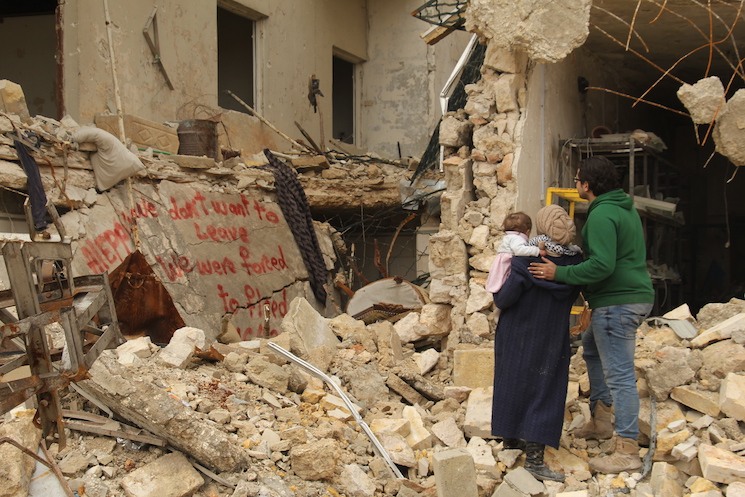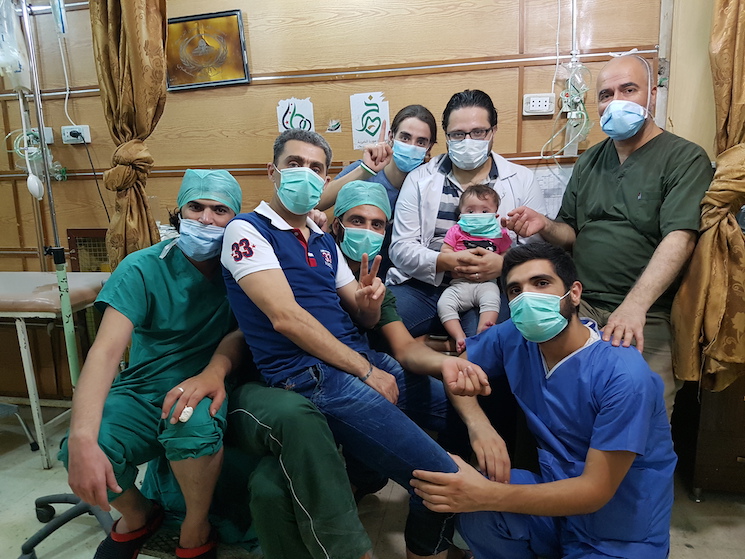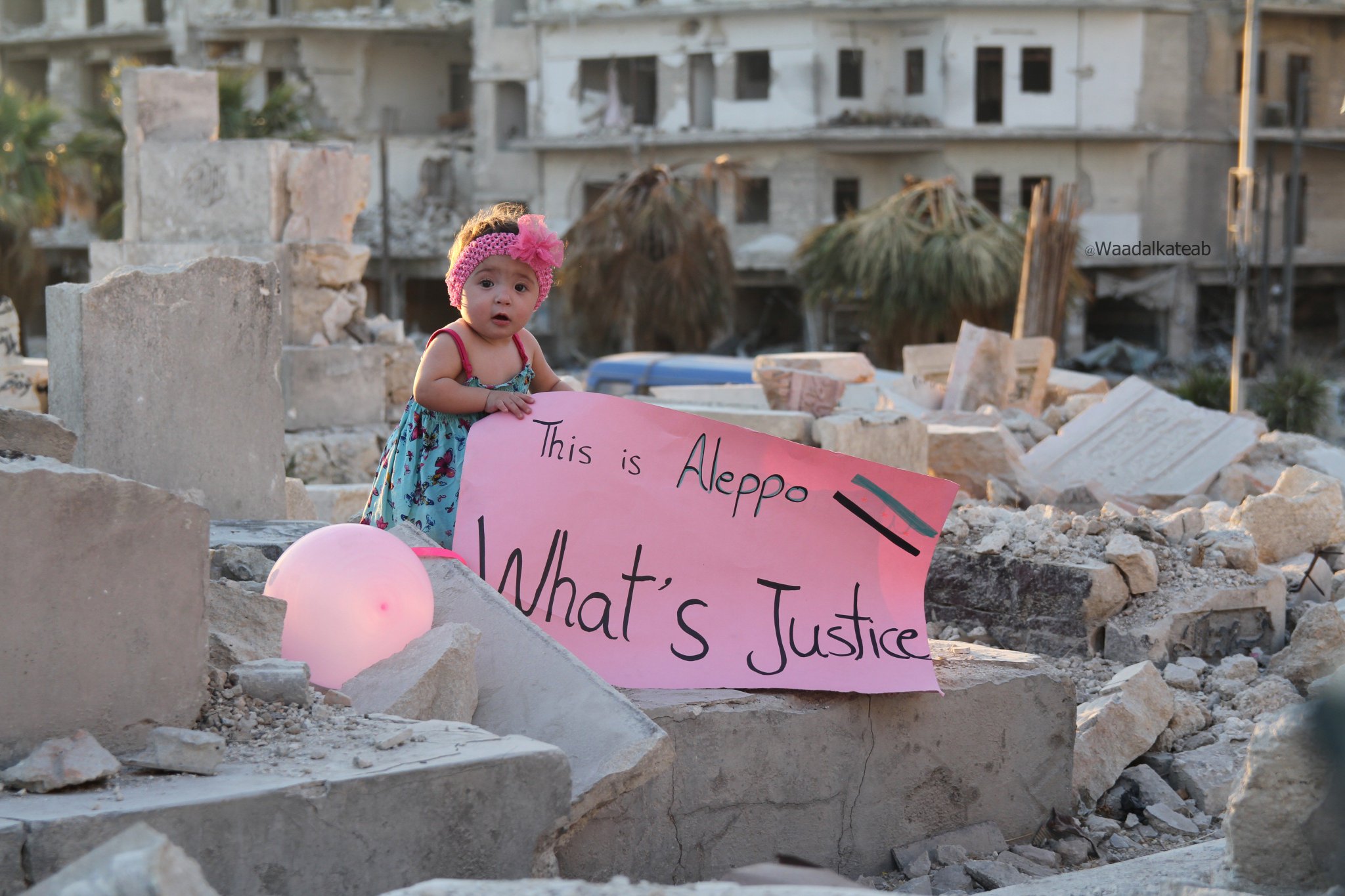“For Sama” – a film you should see (unless you’re an MP, maybe)
We were told that the absence of a large screen was due to the Extinction Rebellion protests in Westminster Square. The reason for the absence of anything but a small handful of MPs was not given, so we could only speculate: XR as well? Brexit-induced agoraphobia? indifference to the plight of Syria and its citizens? or shame at the UK’s limited response to the crisis?
Without a large screen to focus on, we watched the film on a bank of much smaller screens, which would normally be relaying procedures in the Houses of Parliament across the road. We were gathered in Portcullis House (the Westminster building that provides office space for MPs) for a special screening of For Sama, an extraordinary film by Waad al-Kateab and Edward Watts that has been picking up prizes and plaudits around the world since its release earlier this year, and which has now been released in the UK.
For Sama is the film debut of Waad al-Kateab and is a record of four years in Aleppo, from the Syrian uprising to the conclusion of its brutal suppression in 2016, when Russian bombers combined with Syrian army forces to obliterate the last traces of resistance, bombing hospitals in violation of all international law, human decency and common fellow-feeling. Waad, the director as well as the key player of the film, charts her part in the events from enthusiastic supporter of the revolution, to her marriage to Hamza (the main doctor in the hospital where much of the film is shot), to the birth of their daughter Sama and their eventual escape from Aleppo, with government forces closing in on the hospital from a street away.

Waad, Hamza and Sama look at graffiti they painted on a bombed-out building, protesting against the forced exile of the civilian population of east Aleppo by forces of the Syrian regime and their Russian and Iranian allies, December 2016. © PBS Distribution: For Sama
You can see why so many MPs may have chosen to stay away from this screening. For Sama is a very difficult film to watch. On one level, it’s a fairly conventional love story, showing Waad and Hamza (married at the start of the film, he stays in Aleppo to look after the hospital while his then-wife seeks safety elsewhere) becoming friends, falling in love and tending to their new-born daughter, a child who hardly ever cries. The film is shot on Waad’s own hand-held camera and smartphone and has a freshness, a lack of artifice and an authenticity that would make it compelling even if this were the full story.
But, of course, it’s not. The love story is set against the relentless bombardment of Aleppo by Syria’s President Assad’s forces, gleefully supported by Putin’s air force and artillery. The hospital, the main stage on which this tragedy is played out, receives a daily ration of hundreds of victims, whom Hamza and his fellow medics and supporters do all they can to patch up and repair. Miracles are few and far between – though in one a baby, born dead, it appears, from his apparently dead mother, is eventually coaxed and slapped back into life, and the mother too lives. For how long, we are not told. More often, though, the blue sheet is pulled up over the face of the patient, who will then be buried in whatever halfway-dignified circumstances a city so completely under siege allows.
Waad’s camera is unflinching, capturing the distress of a mother who insists on carrying her dead child out of the hospital herself, the dusty numbness on the faces of the two brothers when they are told what they must already have guessed: that the brother they have just brought into the hospital, the last surviving member of their family of ten, is himself dead.
There are moments of relief: the extraordinarily loving family who shares living quarters with Waad’s family in the hospital, the Waad–Hamza–Sama relationship itself, and the unquestioning readiness of people to sacrifice their lives in the service of other people and the belief in and love of their country.

Hamza (with glasses), Sama and the staff of al-Quds hospital, which Hamza set up in 2012 in east Aleppo. © PBS Distribution: For Sama
The focus is on one woman’s camera, documenting her experiences in one hospital in one city in a country ripped apart by conflict. But watching it in Portcullis House you feel, as the main actors in the film must have felt, the painful absence of any countervailing presence, any response – at international or national level – to the despicable violence brought down on these players by a government bent on its own preservation.
So . . . easy to see why so many MPs may have chosen to keep away from the film. But we would urge you to see the film if you can. It is on general release now (details available from the film’s website) and the Migration Museum hopes to be screening it over the coming months.
Above all, it is impossible to watch this film without hearing in your mind the comments made in newspapers, on the radio and elsewhere in this country about immigrants coming to this country purely for their own economic advantage. This film scotches the lie about economic migrants. Until the last moment, when Waad’s camera shows the utter devastation of the once so beautiful Aleppo, none of the people who appear in the film had any thought about leaving the city and the country they love. Anyone who believes that most migration is undertaken for selfish economic advancement should see this film.

Sama pictured in September 2016, in the bombarded east of the city, with a placard in response to US presidential candidate Gary Johnson’s infamous gaffe: “What’s Aleppo?” (https://www.youtube.com/watch?v=fOT_BoGpCn4) © PBS Distribution: For Sama


Leave a Reply